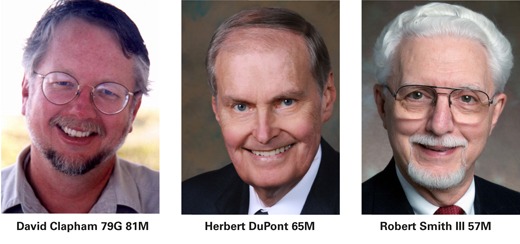Good things come in threes

The Medical Alumni Association honored three physician-scientists during Medical Alumni Weekend this past September.
David Clapham 79G 81M received the Arnall Patz Lifetime Achievement Award, named for the Emory graduate (42C 45M) who became one of the world's leading ophthalmologists. Clapham discovered how calcium and certain proteins on cell surfaces affect ion transfer. Animal cells communicate primarily through the transfer of ions stimulated by electrical charges. Clapham recently discovered a protein in the brain that affects anxiety and another protein that gives sperm an extra hard crack of the tail to penetrate the cell membrane and fertilize an egg. His continuing work studying calcium-conducting ion channels at his lab at Harvard University has been applied in many fields, such as infertility, cardiology, and neurology. Cell communication through ion channels is an important component in developing new drugs that treat depression, cancer, hypertension, male infertility, and heart arrythmias.
Herbert DuPont 65M chose to spend his career battling diarrheal disease, one of the most elusive diseases on the planet. He received the Distinguished Medical Achievement Award.As director of the Center for Infectious Diseases at the University of Texas at Houston and chief of internal medicine at St. Luke's Episcopal Hospital, DuPont aims to keep medicine one step ahead of drug-resistant diarrheal diseases. He has spent the past 40 years working in both the lab and the field, studying the epidemiology, immunology, genetic resistance, and clinical features of travelers' diarrhea. Dupont's research has shown that the semi-synthetic antibiotic Rifaximin effectively treats travelers' diarrhea without creating drug resistance. He also was the principal investigator in a landmark study of a new vaccine for travelers' diarrhea published in The Lancet in 2008.After graduating from Emory, DuPont became an epidemic intelligence officer for the CDC and then joined the University of Maryland. In 1973, he joined the University of Texas at Houston. DuPont helped found the International Society of Travel Medicine and was its first president.
The Medical Alumni Association also presented Robert Smith III 57M its Award of Honor. Smith spent most of his career as a vascular surgeon making sure his patients' hearts could receive and disperse their life's blood. Now Smith is semi-retired from Emory University, still working part-time. Smith was an active member of the First Methodist Church of Atlanta throughout his career. Now he is a dedicated volunteer for the church's outreach program. A board member for the Georgia Prison Ministries Project, Smith coordinates a monthly children's program at a state prison in southeast Atlanta. During his near 50-year career, Smith intertwined administrative roles with groundbreaking clinical work. He participated in Georgia's first organ transplant surgery (kidney) at Emory in 1966, soon after joining the faculty. He served as chief of the surgical service at the Atlanta VA Medical Center and chief of Emory Vascular Service. When he retired in 2006, he had served 11 years as medical director of Emory University Hospital. —Valerie Gregg

